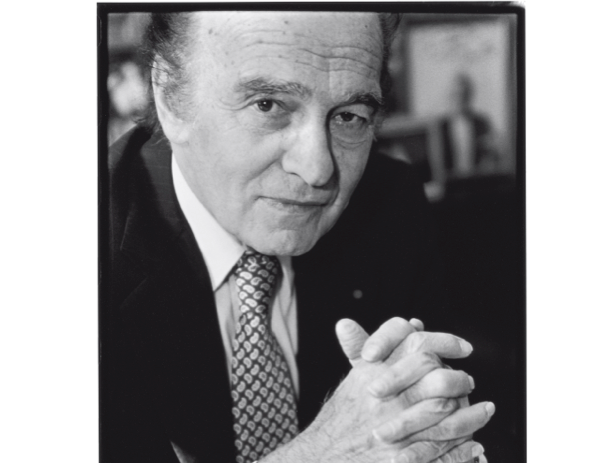As a renowned international attorney and a Holocaust survivor, Samuel Pisar LL.M. ’55 S.J.D. ’59 has experienced mankind’s capacity for genius and madness. His survival was a triumph of human spirit. His advocacy for peaceful coexistence is a message from one who has lived through hell on earth.
One of the youngest survivors of the Nazi death camps, Pisar was 10 when the Soviets occupied his native Poland. The gestapo killed his father, and the Nazis sent his mother and younger sister to their deaths. Pisar was deported to Majdanek, and later Auschwitz and Dachau. He recorded his experiences in a 1979 autobiography, “Of Blood and Hope.”
Pisar did what he could to survive during his four years in the camps. When the Nazis called for tailors, he said he was a buttonhole maker. When he was randomly selected to die in the gas chamber, he seized an abandoned cleaning bucket and scrubbed the floor past the guards and back to the barracks. At the war’s end, he narrowly escaped a death march from Dachau and was liberated by an American tank battalion.
In the rubble of postwar Europe, the 16-year-old built a booming black market business salvaging U.S. military coffee grounds from the trash and selling them to German citizens. Soon he was trading in gas, shoes, cigarettes and liquor. A stint in juvenile detention couldn’t deter him, but an aunt, invoking the memory of his mother, convinced him to abandon his reckless living and emigrate to Australia.
“If I had stayed in Europe, I might have become a terrorist or a gangster,” said Pisar.
He credits his experience in Australia with restoring his physical, moral and intellectual health. He learned “unfathomable” lessons about fair play and gentlemanly behavior. Years later, as chief counsel of the International Olympic Committee, he repaid his debt of gratitude by helping Sydney win the 2000 Olympic Games.
After earning an LL.B. from the University of Melbourne in 1953, Pisar left Australia for HLS. It was another turning point. “There was the strange cohabitation within me of these two disparate human beings,” he said. “The little one–sunken eyes, shaved head, skeletal–and suddenly the scholar who is pretending to compete as if he had had a normal childhood and education.”
The scholar prevailed but the other informed the scholarship. He wrote his master’s thesis on the legal aspects of trade between communist and capitalist countries (published in installments in the Harvard Law Review) and went on to earn doctorates in law from Harvard and the Sorbonne.
In 1960, he was called to Washington to serve on President Kennedy’s Task Force on Foreign Economic Policy. Pisar’s recommendations on trading with the communist bloc formed the basis of his 1970 best-seller, “Coexistence and Commerce,” and became a blueprint for Nixon and Kissinger’s policies toward Eastern Europe, the Soviet Union and China. In 1961, Pisar was made a U.S. citizen by a special act of Congress. In 1974, he was short-listed for the Nobel Peace Prize.
As the global market opened, Pisar expanded his Paris-based practice in international law and business transactions. At one point, he advised more than half the Fortune 100 companies, and his clients included Elizabeth Taylor, Henry Ford and Steve Jobs. But soon he was led to a broader advocacy.
In 1971, Pisar attended a high-level conference in Kiev to discuss East-West economic relations but, after listening to anti-Semitic tirades, felt compelled to speak out on behalf of Russian Jews and dissidents. He pushed for freedom of emigration, and his advocacy helped enact the Jackson-Vanik Amendment, which required the Soviet Union to grant exit visas to an increasing number of refuseniks as a condition of trade with the United States.
Once considered subhuman, identified only by the number tattooed on his arm, today Pisar is a knight of the French Legion of Honor, an honorary officer of the Order of Australia and a commander of Poland’s Order of Merit. His honors and achievement are rooted in pragmatism and hope.
“In spite of everything,” he said, “I have remained an active optimist.”
